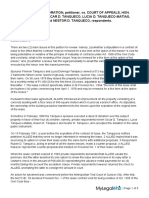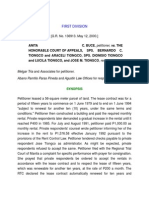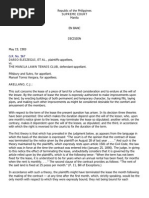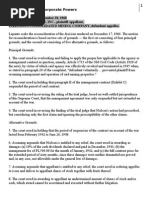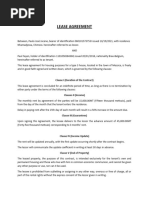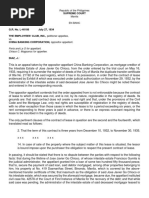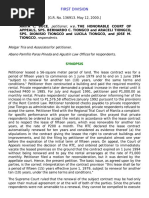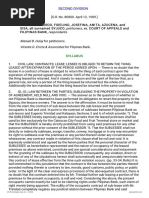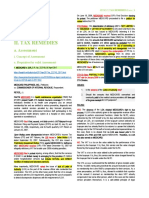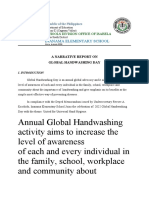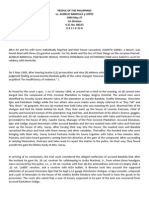0 ratings0% found this document useful (0 votes)
68 viewsBaking V. Director of Prisons
Baking V. Director of Prisons
Uploaded by
Lady Paul Sy1. The document discusses three cases - Baking v. Director of Prisons, Manila Railroad Company v. Insular Collector of Customs, and Lao Lim v. Court of Appeals.
2. In Baking v. Director of Prisons, the court ruled that Article 97 of the RPC regarding good conduct allowance does not apply to detention prisoners, but only to those already convicted and sentenced.
3. In Manila Railroad Company v. Insular Collector of Customs, the court ruled that dust shields used on railway wagons should be classified as detached parts of vehicles for tariff purposes rather than as manufactures of wool.
4. In Lao Lim v. Court of Appeals, the court
Copyright:
© All Rights Reserved
Available Formats
Download as DOCX, PDF, TXT or read online from Scribd
Baking V. Director of Prisons
Baking V. Director of Prisons
Uploaded by
Lady Paul Sy0 ratings0% found this document useful (0 votes)
68 views4 pages1. The document discusses three cases - Baking v. Director of Prisons, Manila Railroad Company v. Insular Collector of Customs, and Lao Lim v. Court of Appeals.
2. In Baking v. Director of Prisons, the court ruled that Article 97 of the RPC regarding good conduct allowance does not apply to detention prisoners, but only to those already convicted and sentenced.
3. In Manila Railroad Company v. Insular Collector of Customs, the court ruled that dust shields used on railway wagons should be classified as detached parts of vehicles for tariff purposes rather than as manufactures of wool.
4. In Lao Lim v. Court of Appeals, the court
Original Description:
Case Digest
Original Title
31-33
Copyright
© © All Rights Reserved
Available Formats
DOCX, PDF, TXT or read online from Scribd
Share this document
Did you find this document useful?
Is this content inappropriate?
1. The document discusses three cases - Baking v. Director of Prisons, Manila Railroad Company v. Insular Collector of Customs, and Lao Lim v. Court of Appeals.
2. In Baking v. Director of Prisons, the court ruled that Article 97 of the RPC regarding good conduct allowance does not apply to detention prisoners, but only to those already convicted and sentenced.
3. In Manila Railroad Company v. Insular Collector of Customs, the court ruled that dust shields used on railway wagons should be classified as detached parts of vehicles for tariff purposes rather than as manufactures of wool.
4. In Lao Lim v. Court of Appeals, the court
Copyright:
© All Rights Reserved
Available Formats
Download as DOCX, PDF, TXT or read online from Scribd
Download as docx, pdf, or txt
0 ratings0% found this document useful (0 votes)
68 views4 pagesBaking V. Director of Prisons
Baking V. Director of Prisons
Uploaded by
Lady Paul Sy1. The document discusses three cases - Baking v. Director of Prisons, Manila Railroad Company v. Insular Collector of Customs, and Lao Lim v. Court of Appeals.
2. In Baking v. Director of Prisons, the court ruled that Article 97 of the RPC regarding good conduct allowance does not apply to detention prisoners, but only to those already convicted and sentenced.
3. In Manila Railroad Company v. Insular Collector of Customs, the court ruled that dust shields used on railway wagons should be classified as detached parts of vehicles for tariff purposes rather than as manufactures of wool.
4. In Lao Lim v. Court of Appeals, the court
Copyright:
© All Rights Reserved
Available Formats
Download as DOCX, PDF, TXT or read online from Scribd
Download as docx, pdf, or txt
You are on page 1of 4
BAKING V.
DIRECTOR OF PRISONS
FACTS: Petitioners concededly had been under detention
for more than eighteen (18) years under the charge of
respondent Director of Prisons when, on May 16, 1969, this Court
in its decision in People vs. Lava, et al., G.R. Nos. L-4974-5-6-7-8,
convicted petitioners for the crime of rebellion and sentenced
each of them to ten (10) years' imprisonment. This decision has
since become final. Petitioner is claiming for allowance for
good conduct as provided for by Art 97 of the RPC.
ISSUE: W/N Art 97 of the RP is applicable to detention
prisoners or prisoners who are just serving preventive
imprisonment
RULING: NO.
The term "any prisoner" in the English text of Art. 97 regarding
good conduct allowance is, in the Spanish text, "el penado,"
who is a convict or a person already sentenced by final
judgment. There is no doubt that Article 97 does not embrace
detention prisoners within its reach because it speaks of the
buena conducta observada por el penado - not one under
"prison preventiva." The allowance for good conduct "for each
month of good behavior" the nun questionably refers to good
behavior of a prisoner while he is serving his term as a convict
and not otherwise. Inasmuch as the Revised Penal Code was
originally approved and enacted in Spanish, the Spanish text
governs.
MANILA RAILROAD COMPANY V. INSULAR COLLECTOR OF CUSTOMS
FACTS: Appellee Manila Railroad Company used dust
shields made of wool on all of its railway wagons to cover the
axle box which protects from the oil deposited therein which
serves as lubricant of the bearings of the wheel. Under par.141
of Sec. 8 of the Tariff Law of 1909, manufactures of woo;, not
otherwise provided for are subject to 40% ad valorem. On the
other hand, under par.197 of same law, vehicles for use on
railways and tramways, and detached parts thereof are
subject to 10% ad valorem. Appellant Insular Collector of
Customs classified dust shields as manufactures of wool, not
otherwise provided for. Upon appeal, however, the CFI
overruled the decision and classified dust shields as detached
parts of vehicles for use on railways.
ISSUE: Whether or not dust shields should be classified as
manufactures of wool or as detached parts of vehicles for use
on railways
RULING: Dust shields are classified for the purposes of tariff as
detached parts of vehicles under par.197. It is a general rule in
the interpretation of statutes levying taxes not to extend their
provisions beyond the clear import of the language used. In
case of doubt, they should be construed strictly against the
government and in favor of the citizen. And when there is in the
same statute a particular enactment and a general one which
in its comprehensive sense would include what is embraced in
the former, the particular enactment must be operative, and
the general one must be taken to affect only such cases within
its general language as are not within the provisions of the
particular enactment.
LAO LIM V. COURT OF APPEALS
FACTS: Records show that Francisco Lim, entered into a
contract of lease with Benito Dy for a period of 3 years, from
1976 to 1979. After the stipulated term expired the respondent
refused to leave the premises, so Francisco Lim filed an
ejectment suit against Benito Dy. This case was then taken over
by a judicially approved compromise agreement which
provides an automatic increase in rent of 20% every 3 years. On
1985 Dy, informed Lim of his intention to renew the lease up to
1988, Lim did not agree to the renewal.
In 1987 another ejectment suit was filed by Lim after the failure
of Dy to vacate the premises. It was dismissed by the RTC and
later affirmed by the CA for the following reasons: (1) the
stipulation in the compromise agreement which allows the
lessee (Benito Dy) to stay on the premises as long as he needs it
and can pay rents is valid, being a resolutory condition, and
therefore beyond the ambit of art 1308 of the NCC; and (2) the
compromise agreement has the effect of res judicata.
ISSUES: Was the stipulation in the compromise agreement
which allows the lessee to stay on the premises as long as he
needs it and can pay rents is valid?
RULING: NO.
Since the stipulation for as long as the defendant needed the
premises and can meet and pay said increases is a purely
potestative condition because it leaves the effectivity and
enjoyment of leasehold rights to the sole and exclusive will of
the lessee. The continuance, effectivity, and fulfillment of a
contract of lease cannot be made to depend exclusively upon
the free and uncontrolled choice of the lessee between
continuing payment of the rentals or not, completely depriving
the owner of any say in the matter. Mutuality does not obtain in
such a contract of lease and no equality exists between the
lessor and the lessee. The decision of the Court of Appeals is
REVERSED AND SET ASIDE. Benito Dy is ordered to immediately
vacate and return the possession of the premises and pay the
monthly rentals due thereon in accordance with the
compromise agreement until he shall have actually vacated
the same. This Judgment is immediately executory.
You might also like
- Simple Guide for Drafting of Civil Suits in IndiaFrom EverandSimple Guide for Drafting of Civil Suits in IndiaRating: 4.5 out of 5 stars4.5/5 (4)
- Journalism TerminologyDocument4 pagesJournalism TerminologyshakhenNo ratings yet
- Lao Lim Vs CA Case DigestDocument3 pagesLao Lim Vs CA Case DigestLariza Aidie100% (2)
- Cruz Vs Puno 120 S 497Document3 pagesCruz Vs Puno 120 S 497tengloyNo ratings yet
- G.R. No. 142378Document6 pagesG.R. No. 142378AnnNo ratings yet
- Case Digest in ADR-Dela Merced v. Roman Catholic Archbishop of ManilaDocument2 pagesCase Digest in ADR-Dela Merced v. Roman Catholic Archbishop of ManilaAllan EsmaelNo ratings yet
- LAO LIM vs. CADocument2 pagesLAO LIM vs. CAMaya Julieta Catacutan-Estabillo100% (2)
- Lao Lim v. CADocument3 pagesLao Lim v. CARem SerranoNo ratings yet
- Millare v. HernandoDocument3 pagesMillare v. HernandoMelissa Hill100% (1)
- Another: Lease of A Piece of LandDocument7 pagesAnother: Lease of A Piece of LandWinter WoodsNo ratings yet
- Allied Banking Corp Vs CA Et AlDocument5 pagesAllied Banking Corp Vs CA Et AlAngelo GabrilloNo ratings yet
- Allied Bank VS CaDocument4 pagesAllied Bank VS CaRhei BarbaNo ratings yet
- Francisco Lao Lim vs. CA GR No. 87407, Oct 31, 1990Document7 pagesFrancisco Lao Lim vs. CA GR No. 87407, Oct 31, 1990Charles BayNo ratings yet
- 7 Buce Vs CaDocument13 pages7 Buce Vs CaEMNo ratings yet
- Eleizegui Vs Manila Lawn Tennis ClubDocument6 pagesEleizegui Vs Manila Lawn Tennis ClubJohn Nicolai Gamora CedromeNo ratings yet
- CORPO CASES v. Corporate PowersDocument94 pagesCORPO CASES v. Corporate PowersAn JoNo ratings yet
- G.R. No. 87047 October 31, 1990FRANCISCO LAO LIM Ca and Benitovillavicencio Dy The CaseDocument5 pagesG.R. No. 87047 October 31, 1990FRANCISCO LAO LIM Ca and Benitovillavicencio Dy The CaseVictor LimNo ratings yet
- Allied Bank vs. CADocument3 pagesAllied Bank vs. CAglorybelle01No ratings yet
- Gener E. Asuncion For Petitioner. Natividad T. Perez For Private RespondentDocument3 pagesGener E. Asuncion For Petitioner. Natividad T. Perez For Private RespondentViner Hernan SantosNo ratings yet
- Preparatory To Filing An Ejectment CaseDocument8 pagesPreparatory To Filing An Ejectment CaseInnoKalNo ratings yet
- Allied Banking Corp V CADocument4 pagesAllied Banking Corp V CAEstelle Rojas TanNo ratings yet
- LAO LIM Vs CADocument2 pagesLAO LIM Vs CAAleezah Gertrude Regado100% (1)
- LEASE of LANDS Sample Cases DigestDocument26 pagesLEASE of LANDS Sample Cases DigestEdel VillanuevaNo ratings yet
- Plaintiff-Appellee vs. vs. Defendant-Appellant: en BancDocument19 pagesPlaintiff-Appellee vs. vs. Defendant-Appellant: en BancReyar SenoNo ratings yet
- Mactan-Cebu International Airport Authority V. Benjamin Tudtud, Et Al. 571 SCRA 165 (2008)Document13 pagesMactan-Cebu International Airport Authority V. Benjamin Tudtud, Et Al. 571 SCRA 165 (2008)MonicaSumangaNo ratings yet
- #144 - Francisco Lao Lim vs. CA - NaungayanDocument2 pages#144 - Francisco Lao Lim vs. CA - NaungayanJo NaungayanNo ratings yet
- Hibberd v. McElroyDocument5 pagesHibberd v. McElroyCLark BarcelonNo ratings yet
- Lao Lim Vs CA Case DigestDocument3 pagesLao Lim Vs CA Case DigestOwen Buenaventura100% (1)
- Petitioners vs. vs. Respondents Feria, Feria, Lugtu & Lao Deogracia EufemioDocument6 pagesPetitioners vs. vs. Respondents Feria, Feria, Lugtu & Lao Deogracia EufemioJuana Dela VegaNo ratings yet
- Mercys Inc Vs VerdeDocument5 pagesMercys Inc Vs VerdeAriel Conrad MalimasNo ratings yet
- Contrato Arrendamento (English Translated)Document3 pagesContrato Arrendamento (English Translated)Ednaldo PauloNo ratings yet
- Oblicon Cases Fourth and Fifth Assignment (Lim To Alipio)Document275 pagesOblicon Cases Fourth and Fifth Assignment (Lim To Alipio)Eins BalagtasNo ratings yet
- Sales Last PDFDocument67 pagesSales Last PDFNaika Ramos LofrancoNo ratings yet
- Lim Vs Ca - OdtDocument4 pagesLim Vs Ca - OdtJason M. ManuelNo ratings yet
- 07 The Employees Club Inc Vs China Banking CorporationDocument3 pages07 The Employees Club Inc Vs China Banking CorporationAirelle AvilaNo ratings yet
- Sy V AndoksDocument4 pagesSy V AndoksMarian ChavezNo ratings yet
- Sample Position Paper For EjectmentDocument7 pagesSample Position Paper For EjectmentsuckerforsoccerNo ratings yet
- 20 Eleizegui V Lawn Tennis ClubDocument2 pages20 Eleizegui V Lawn Tennis ClubluigimanzanaresNo ratings yet
- Lim v. CA, GR No. 87047Document7 pagesLim v. CA, GR No. 87047JoyNo ratings yet
- GOAL Inc v. CA, GR No. 118822Document3 pagesGOAL Inc v. CA, GR No. 118822Nikki Rose Laraga AgeroNo ratings yet
- Buce-v-CADocument4 pagesBuce-v-CARobert Jayson UyNo ratings yet
- Petitioner, Respondents Melgar Tria Associates Abano Pamfilo Paras Pineda Agustin Law OfficesDocument9 pagesPetitioner, Respondents Melgar Tria Associates Abano Pamfilo Paras Pineda Agustin Law OfficesXyrus BucaoNo ratings yet
- Mecano v. COA To Iron & Steel v. CADocument23 pagesMecano v. COA To Iron & Steel v. CARA BautistaNo ratings yet
- Petitioners vs. vs. Respondents Manuel B. Dulay Vicente G. Ericta & AssociatesDocument11 pagesPetitioners vs. vs. Respondents Manuel B. Dulay Vicente G. Ericta & AssociatesJuana Dela VegaNo ratings yet
- Finals CasesDocument21 pagesFinals CasesecsanjuanNo ratings yet
- Heirs of Dimaculangan VDocument5 pagesHeirs of Dimaculangan VMeet MeatNo ratings yet
- Autonomy of Contracts To Relativity of Contracts DigestDocument15 pagesAutonomy of Contracts To Relativity of Contracts DigestKim DiazNo ratings yet
- Singson vs. CaltexDocument7 pagesSingson vs. CaltexElephantNo ratings yet
- Article 1687 of The New Civil CodeDocument12 pagesArticle 1687 of The New Civil CodeNelly HerreraNo ratings yet
- Rent Restriction LawsDocument42 pagesRent Restriction LawsFuture LinksNo ratings yet
- Plaintiffs-Appellees Defendant-Appellant Cohn, Fisher & DewittDocument6 pagesPlaintiffs-Appellees Defendant-Appellant Cohn, Fisher & Dewitt149890No ratings yet
- On Implied New LeaseDocument31 pagesOn Implied New LeaseAlexandra KhadkaNo ratings yet
- Buce V CADocument2 pagesBuce V CARaymond ChengNo ratings yet
- Joaquin Rivera v. Verne La Crosse, and Third Party Caribbean Tire, Inc. v. Virgin Islands National Bank, Third Party, 490 F.2d 1380, 3rd Cir. (1974)Document3 pagesJoaquin Rivera v. Verne La Crosse, and Third Party Caribbean Tire, Inc. v. Virgin Islands National Bank, Third Party, 490 F.2d 1380, 3rd Cir. (1974)Scribd Government DocsNo ratings yet
- Francisco Lao Lim Vs CADocument2 pagesFrancisco Lao Lim Vs CASarah Tarala MoscosaNo ratings yet
- 5 Position Paper (Plaintiff)Document7 pages5 Position Paper (Plaintiff)Kirt CatindigNo ratings yet
- Tacita ReconduccionDocument8 pagesTacita ReconduccionJessica VillarmenteNo ratings yet
- PNCC v. COURT OF APPEALSDocument4 pagesPNCC v. COURT OF APPEALSRose De JesusNo ratings yet
- 7 Lao Lim v. CADocument6 pages7 Lao Lim v. CATon RiveraNo ratings yet
- The Universal Copyright Convention (1988)From EverandThe Universal Copyright Convention (1988)No ratings yet
- English in Law (Advanced): A Compendium of Legal English for Advanced and Proficiency StudentsFrom EverandEnglish in Law (Advanced): A Compendium of Legal English for Advanced and Proficiency StudentsNo ratings yet
- Leal Vs IACDocument7 pagesLeal Vs IACLady Paul SyNo ratings yet
- C Vat DigestDocument35 pagesC Vat DigestLady Paul SyNo ratings yet
- Tax Remedies: Part 1: Stages of BIR Audit InvestigationDocument11 pagesTax Remedies: Part 1: Stages of BIR Audit InvestigationLady Paul SyNo ratings yet
- D Tax RemediesDocument107 pagesD Tax RemediesLady Paul SyNo ratings yet
- 1 Full TextDocument50 pages1 Full TextLady Paul SyNo ratings yet
- C 123 ErtDocument67 pagesC 123 ErtSwarnim PandeyNo ratings yet
- Crim Pro Subject Outline 2022.j.villenaDocument4 pagesCrim Pro Subject Outline 2022.j.villenaAnastacio, Micah Ann, G.No ratings yet
- Texas Senate Bill 11Document37 pagesTexas Senate Bill 11KCEN Channel 6No ratings yet
- General Assembly: United NationsDocument23 pagesGeneral Assembly: United NationsJesús UrbinaNo ratings yet
- Discrepancies of Tempat KejadianDocument5 pagesDiscrepancies of Tempat KejadianMin SugarNo ratings yet
- Detailed Lesson Plan in Social Studies "The Branches of Government"Document2 pagesDetailed Lesson Plan in Social Studies "The Branches of Government"Christina PalattaoNo ratings yet
- V-2 G.R. No. 185954 Ombudsman V SisonDocument8 pagesV-2 G.R. No. 185954 Ombudsman V SisonIter Mercatabant0% (1)
- ASME PTC 8.2 - Centrifugal PumpsDocument88 pagesASME PTC 8.2 - Centrifugal Pumpstaguma PEDZISAINo ratings yet
- Del Socorro vs. Van WilsemDocument3 pagesDel Socorro vs. Van WilsemMikkoy1880% (5)
- Ict Policies and IssuesDocument15 pagesIct Policies and IssuesShela TupagNo ratings yet
- Maura's BriefDocument28 pagesMaura's BriefStephen PopeNo ratings yet
- No - GOB (I) 1/2020 High Court of Karnataka, Bengaluru, Dated: 30 MARCH, 2020Document4 pagesNo - GOB (I) 1/2020 High Court of Karnataka, Bengaluru, Dated: 30 MARCH, 2020Ravi BadriNo ratings yet
- Legal EthicsDocument99 pagesLegal EthicsGlaiza Mae MasaoyNo ratings yet
- 2013 crimGN PDFDocument316 pages2013 crimGN PDFmarj100% (1)
- Day 10 - Millado Dan 2Document14 pagesDay 10 - Millado Dan 2Dan R. MilladoNo ratings yet
- The Trial of Sacco & Vanzetti: Alexys Boonkokua & Davis Lucky Senior Division Group WebsiteDocument2 pagesThe Trial of Sacco & Vanzetti: Alexys Boonkokua & Davis Lucky Senior Division Group WebsiteDavisLuckyNo ratings yet
- H.R AssignmentDocument12 pagesH.R AssignmentNaveen VermaNo ratings yet
- Justice Carpio Dissenting OpinonDocument12 pagesJustice Carpio Dissenting OpinonGMA News Online100% (1)
- Judicial Notice Group CDocument7 pagesJudicial Notice Group CWangalya EdwinNo ratings yet
- Assignment 1 Constitutional LawDocument10 pagesAssignment 1 Constitutional LawFrancis Banda50% (2)
- Leha Binte Jusoh V Awang Johari Bin HashimDocument4 pagesLeha Binte Jusoh V Awang Johari Bin HashimChin Kuen Yei100% (1)
- Criminal Law OutlineDocument56 pagesCriminal Law OutlineThomas JeffersonNo ratings yet
- Financial Technologies (India) Limited CSR PolicyDocument8 pagesFinancial Technologies (India) Limited CSR PolicyBhomik J ShahNo ratings yet
- Tcad LawsuitDocument47 pagesTcad LawsuitAnonymous Pb39klJNo ratings yet
- Tronvol and AalenDocument10 pagesTronvol and AalenBewesenuNo ratings yet
- Media Plan For Vans: Situational AnalysisDocument4 pagesMedia Plan For Vans: Situational AnalysisAishaNo ratings yet
- Handwashing NarrativeDocument9 pagesHandwashing NarrativeMaria Angelica BermilloNo ratings yet
- Ra 10581Document41 pagesRa 10581jewelleferrerNo ratings yet
- GR No. 89223 PP v. BandulaDocument6 pagesGR No. 89223 PP v. BandulaTroy San MarNo ratings yet










